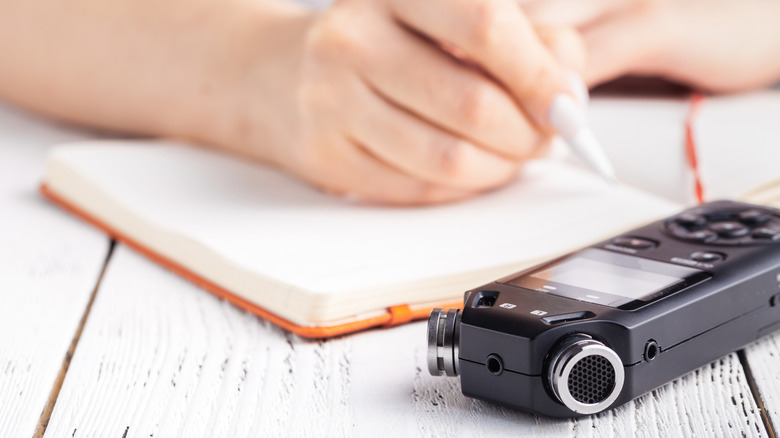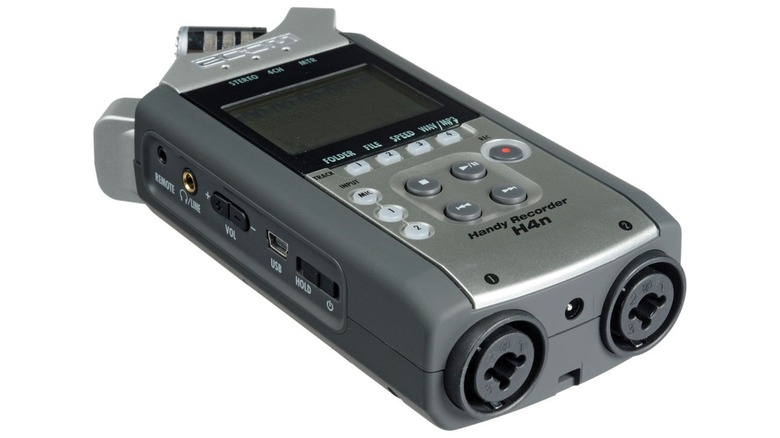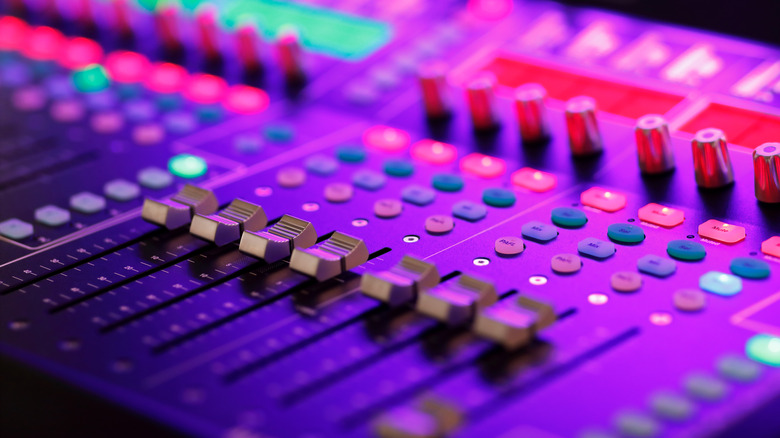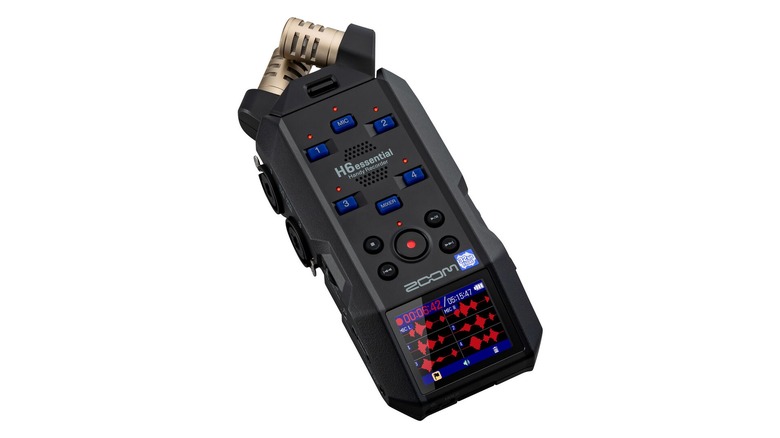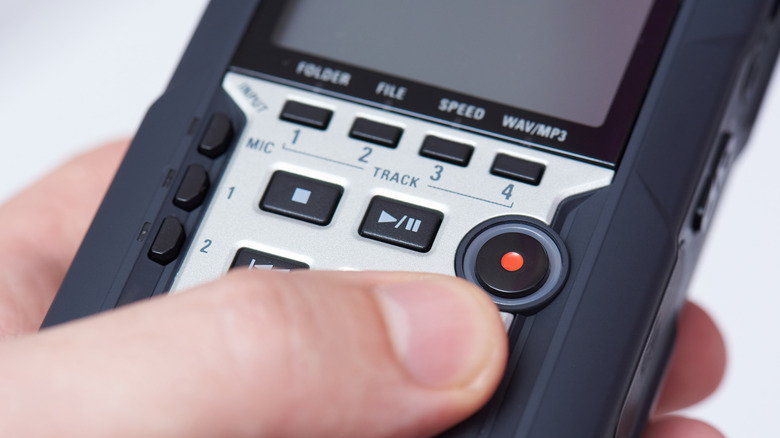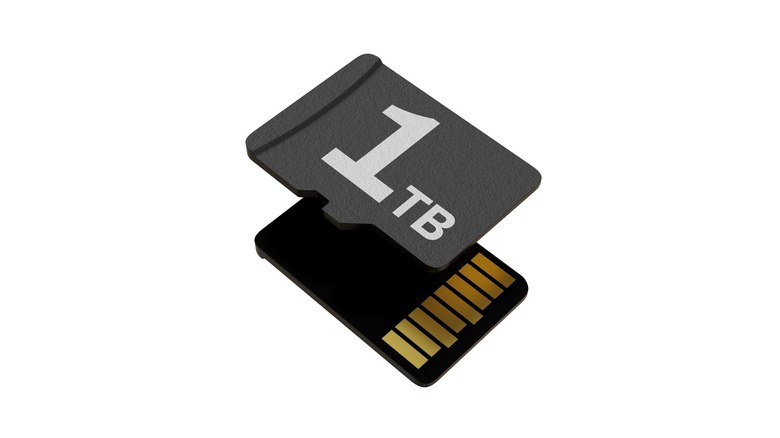5 Things You Need To Consider Before Buying A Handheld Recorder
We may receive a commission on purchases made from links.
For the average person, their smartphones are loaded with helpful tools and should be more than enough to carry out whatever field audio recording functions they will ever need, with the best voice recording apps offering extra functionality beyond basic expectations. Depending on the phone and software used, the results can even be surprisingly high quality. If you're someone who would have bought a cheap voice recorder for memos, lectures, or occasional in-person interviews in the pre-smartphone era, then your phone is more than enough.
But if you're recording more than the likes of voice memos or one-on-one in-person conversations, or you intend for the end product to be something disseminated to the public as a consumer product like a premium podcast or commercial music, then you're better off buying a dedicated portable audio recorder. There are many reasons to pick these, like superior built-in microphones, inputs for higher-quality external microphones, multitrack recording, and higher-quality recording formats. There are a myriad of reasons you might just want a dedicated device regardless, like reducing battery drain on your phone or having more storage since microSD card slots are becoming less and less common on major handsets.
If you're reading this, you probably already know some of this and have decided to buy a dedicated recorder. But if you're not sure which, we have five things that you need to consider before deciding to buy whatever recorder you pick from Zoon, Tascam, or one of their competitors.
Figure out your budget and what features you need
The first thing that you need to consider is exactly how much you're willing to spend. For the most part, you should be able to find what you need for $400 or less. Narrowing down recorders from there comes to what particular features you're looking for.
If you're just looking for a higher-quality alternative to your phone, that's easy. You can just get whatever entry-level prosumer recorder you like for $100 or less, like the Zoom H1essential. But if you need more, it comes down to exactly what you need and why. If you're using the recorder for a podcast, then you probably want one that has XLR inputs for higher-end microphones.
If you're recording music, then a recorder with 24-bit or better high-resolution recording modes might be a good feature to look out for as well, though the benefits of higher bit depths and sample rates are not exactly settled science. Another factor to consider as a musician is if the recorder can accept inputs from certain instruments, like guitars, and if it has a mixer built-in. And one feature that potentially has value to both podcasters and musicians is multi-track recording, giving you more options for editing and production in general by putting each input on its own track.
Basically, you want to comparison shop, see which features are must-haves for you, and figure out what the best deal is among recorders checking those boxes.
How many channels of audio do you need?
One factor that's going to vary by your specific use case is how many channels of audio the recorder can record discretely from distinct microphones. Having each voice and/or instrument on its own track makes it worlds easier to edit and get the most out of. This is why the surviving Beatles and their producers couldn't finish "Now and Then" until 2023: They didn't have access to the Peter Jackson-developed "demixing" technology that let them work off of John Lennon's unsophisticated demo tape until the last few years, at which point they could separate and clean up his vocals.
If you're a podcaster who records their shows in person, this relies on how many people you expect to have on your show with any regularity. If it's always just going to be you and a co-host, then a 2-channel stereo recorder is fine. But if you regularly have more than two people on the show at a time, then you want separate channels for all of them, meaning you want at least a 4-track recorder with at least four microphone inputs. A lot of recorders have multiple tracks without multiple XLR inputs, though, instead recording the extra tracks beyond their two XLR inputs from the built-in mics. If you need multiple XLR inputs, you might be best off with something like the Tascam Portacapture X8, which can record eight channels and has four XLR inputs.
Do you also need a USB audio interface for your computer?
What if you are in the market for a handheld recorder, but it's not something you'll need all the time? What if you only need one for certain on-the-go recording scenarios, but will also be recording just as much onto your computer? If that's the case, then you're best off getting a handheld recorder that also doubles as a USB audio interface.
A USB audio interface is exactly what it sounds like, an analog-to-digital converter that can be used to hook microphones up to your computer. These exist on their own and are also built into USB audio mixers, but there are also handheld recorders that double as USB audio interfaces, giving you more bang for your buck. There are a number of reasons that you might want to use a computer-based solution to record over saving to a handheld recorder, the most obvious of which is so you can manipulate the audio in real-time using whatever digital audio workstation (DAW for short) app you prefer.
Zoom's H6essential is a quality option that doubles as a USB audio interface, and it's also a good multitrack choice. With 6-channel recording that includes four XLR inputs on top of the two built-in microphones, it gives you a lot of flexibility for its $299.99 retail price.
What recording formats appeal to you and why?
As noted earlier, exactly what formats the handheld recorder can encode your files in is an important configuration. If you're already s[spending money on a dedicated recorder, you're aiming for higher quality, so, naturally, you're going to at least want something that records uncompressed LPCM audio to start with, as opposed to a cheap voice recorder that only does lossy compressed MP3. That's simple enough. Where it gets more complicated is if you want or need the ability to record high-resolution audio: Files with bit depths (number of amplitude values per sample) of 24-bit or 32-bit (instead of CD-quality 16-bit) and potentially sample rates (number of samples per second) of 88.2kHz or more (as opposed to CD-quality 44.1kHz), or using alternate hi-res formats like DSD.
In theory, hi-res audio, by allowing for each file to consist of more and higher-quality samples, results in a better, more detailed, and arguably "more analog" sounding file than one recorded at CD quality. In practice, though? The jury's out. Even if you have a recording with a very wide dynamic range, CD quality may still be enough to represent it properly. Paul McCartney, for example, released much of his catalog as hi-res downloads that included special "unlimited" versions without any dynamic range compression or peak limiting applied to the CD versions. However, in practice, the "unlimited" versions often had comparable dynamic range to other CD versions of the same album.
What kinds of microSD cards does it support?
Pretty much all notable handheld recorders have microSD card slots these days, so discussing whether or not you want to look for a recorder with upgradable storage is moot because it will be there regardless of what you pick. However, not all of them can accept all of the same microSD cards you might have laying around.
Recording uncompressed audio takes up a lot of space, especially if you choose to go hi-res. So if you're going to be doing a lot of recording, you might want more space, and that's where to need to consider what revision of the microSD format you'll need your recorder to accept. The original SD card format holds up to 2GB, SDHC expanded it to 32GB, SDXC dramatically increased the limit to 2TB, and SDUC goes all the way up to 128TB. (SDUC cards aren't available yet, though, and it will probably be a while before we see them.) In practice, the recorders on the market these days will support up to microSDHC or microSDXC.
So, if you think that 32GB capacity sounds too small for you, you need to make absolutely sure that you're buying a recorder that supports the higher-capacity microSDXC cards.
